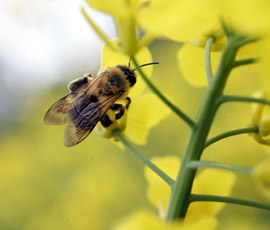Greenpeace urges ban on bee-harming pesticides

Greenpeace has called on European countries to take urgent action and ban pesticides that cause harm to bees.
The study Bees in Decline highlights the ecological and economic importance of healthy bee populations and the factors putting pollinators at risk. These include disease, parasites and climate change.
However it is neonicotinoid pesticides that have attracted most criticism in the study, released on Tuesday (9 April).
The report identifies seven priority pesticides that should be banned, including three neonicotinoid pesticides produced by Bayer CropScience and Syngenta, which contain the chemicals imidacloprid, thiamethoxam and clothianidin.
It also advocates plans to ban all pesticides harmful to bees, shift funding away from chemical-intensive agriculture and promote ecological farming.
Matthias Wüthrich, international bees project leader at Greenpeace, said: “The negative impacts of bee-harming pesticides by far exceed any presumed benefits. Our bees and wild pollinators are too precious to lose.
“EU countries simply can’t wait any longer and must take immediate action with a complete and immediate ban on these bee-killers.”
The report looks at the ability of bees to resist diseases and parasites, which it suggests is directly influenced by their exposure to such toxic chemicals, with huge consequences for the health and survival of honeybees and other wild pollinators
Although it says bee deaths are a major worry, the report also highlights physiological effects on bees, including perturbation of the foraging pattern, interference with feeding behaviour and impacts on learning processes.
The report is part of a new European-wide campaign from Greenpeace to save bees and promote ecological agriculture that produces food without chemicals and provides healthier habitats for domesticated and wild pollinators.
Last week, a cross-party group of government MPs called on the government to introduce a precautionary moratorium on neonicotinoids until the science proves their use is safe for bees.
However, DEFRA has recently published a summary of research, and concluded that the risk to bee populations from neonicotinoids, as they are currently used through seed treatments, is low.

